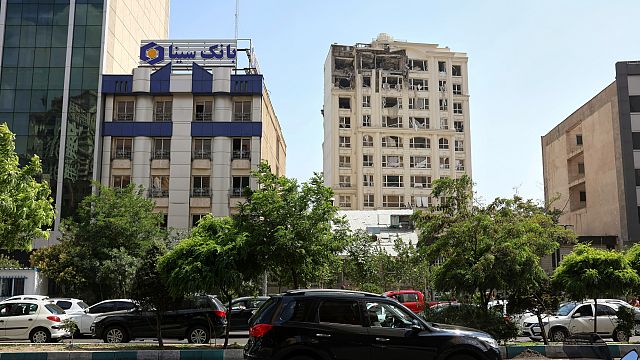How Companies Are Bracing for Trump’s Immigration Crackdown

Sectors including construction, hospitality, health care and manufacturing are on high alert. Economists are worried about the labor market and growth. If you’re just waking up, there has been a tragic plane crash in India, which involved a Boeing 787-8 Dreamliner with 242 people on board. Our colleagues in India and elsewhere are providing updates here. It is a human catastrophe, but we will also be focused on the ramifications for Boeing, whose stock is down about 8 percent in premarket trading. On Thursday, we’re looking at how the administration’s crackdown on illegal immigration is starting to affect businesses directly. We’re also going deep on fintech’s newest darling, stablecoins. And we take a first look at a big fund-raising round for — of all things — a networking start-up. President Trump’s crackdown on illegal immigration is rapidly moving beyond Los Angeles, threatening to destabilize companies across the country. The president has vowed a national effort that is leaving businesses and their employees on edge and economists worried about the long-term growth risks, Danielle Kaye reports. “One of the main concerns is a loss of valuable workers,” Shanon Stevenson, a partner at the employment law firm Fisher Phillips who specializes in immigration, told DealBook. On Tuesday, she said, she was swamped with calls from businesses across America who fear having to shut down some operations, and potentially losing business and customers. Nerves are particularly high in sectors like construction, hospitality, health care and manufacturing. The Associated General Contractors of America has been telling contractors to prepare for construction site visits from agents with Immigration and Customs Enforcement, according to Brian Turmail, a spokesman for the group. Raids have occurred across the country: Stephen Miller, a White House aide, directed ICE officials in late May to target day laborers who typically gather near Home Depot stores, and 7-Eleven convenience stores, The Wall Street Journal reported. Home Depot is telling store associates to report raids near its stores immediately, a spokeswoman for the retailer told DealBook. (The spokeswoman said it isn’t notified ahead of time that raids are going to happen.) Immigration officials targeted Ambiance Apparel, a clothing manufacturer in downtown Los Angeles. The company was not notified in advance and is “deeply concerned” for its employees, Benjamin Gluck, a lawyer for the company, told DealBook. The Los Angeles Times reported that raids in the city had also taken place at smaller stores, including a carwash and a doughnut shop. Sweeps are accelerating beyond California, too. In Omaha, dozens of people were reportedly detained on Tuesday when officials showed up at a meat production plant. Employers are preparing. That might mean conducting I-9 audits to assess their exposure to immigration enforcement actions. If agents do arrive, lawyers are telling companies to check whether they have a signed judicial warrant, make a list of everything officials take from the workplace and document who is detained or taken away. There are broader implications for the U.S. economy. Even companies that haven’t been targeted by ICE may feel the fallout as more employees stop showing up to work out of fear of possible raids. But a decline in immigration to the U.S. overall will create a long-term drag on growth, economists at Nomura found. “The bigger factor by far is the decline in the number of people entering the U.S., not the increase in the number exiting,” David Seif, the chief economist for developed markets at Nomura, told DealBook. Lower growth could have wide-ranging policy implications, he added, making “it less likely for the Fed to cut rates, all else equal.” A Boeing jet operated by Air India crashes, with 242 abroad. The plane, which was bound for London, crashed shortly after taking off from the western Indian city of Ahmedabad, according to the airline. Flight-tracking records showed the jet was a 787-8 Dreamliner; shares in Boeing, which has struggled to recover from fatal crashes several years ago, were down 8 percent in premarket trading. Oil prices remain higher amid tensions in the Middle East. Brent crude, the international benchmark, traded at more than $68 on Thursday. The latest: Israel appears ready to attack Iran, The Times reports, a possibility that led the U.S. to withdraw diplomats from Iraq amid fears that Tehran may also retaliate. And the International Atomic Energy Agency declared on Thursday that Iran wasn’t complying with nuclear nonproliferation obligations. Apollo Global Management refrains from recruiting junior banker candidates. The private equity giant told the investment-banking class of 2027 that it wouldn’t extend job offers to them. The move comes amid a backlash by banks angered that private equity firms are signing up their new recruits so soon in their careers: Marc Rowan, Apollo’s C.E.O., told Bloomberg that he agreed with criticism of the practice by Jamie Dimon of JPMorgan Chase, who said, “I just don’t like it.” Investors seem unimpressed with Wednesday’s double dose of good news: a handshake agreement between U.S. and Chinese negotiators to de-escalate their trade dispute — President Trump said that relations with Beijing were now “EXCELLENT!” — and an upbeat inflation report. Global markets are down on Thursday, as are S&P 500 futures. That may be partly because of Trump himself, who also poured cold water on a broader trade war truce. First, the good news: Economists had been bracing for Wednesday’s Consumer Price Index report to show the first clear signs of the trade war driving up prices. Yet “core” inflation steadied at 2.8 percent year-on-year — the fourth consecutive month in which this closely watched metric came in below analysts’ expectations, according to Deutsche Bank. That prompted Trump to urge the Fed to cut interest rates by a full percentage point. (The futures market on Thursday was penciling in about half that by year-end.) But signs of turbulence are emerging. While core goods inflation was a tick lower year-on-year, several categories — including toys and major appliances — saw big jumps in price. The prices of new and used vehicles and apparel actually fell year-on-year, defying expectations. But economists believe that benign reading was a result of companies stocking up inventories to beat the tariffs hit. And, they believe consumers may be pulling back, keeping a lid on inflation. “We pencil in larger tariff effects starting later in the summer,” Veronica Clark, an economist at Citigroup, wrote in an investor note on Wednesday. (Trump suggested that a broader pause in his trade fights was far off, saying Wednesday that his administration would send trading partners letters in the coming days warning them of potentially higher tariff rates.) Thursday’s Producer Price Index report should further clarify whether Clark’s call is correct. The GENIUS Act passed a significant Senate procedural hurdle on Wednesday, moving one step closer to expansive new regulations of so-called stablecoins. While some critics of the bill fear that it will let tech companies become more powerful, another significant debate has emerged over whether it will bolster or undercut America’s banking system and financial markets. Stablecoins could grow into a greater than $2 trillion market in the coming years, Treasury Secretary Scott Bessent testified on Capitol Hill on Wednesday. If that prediction holds, stablecoin issuers would need to buy a lot of liquid assets — think short-term Treasury notes and bonds, as well as dollar deposits — to back their digital tokens, and that could strengthen the buck and bring down certain Treasury yields. The pro argument: Senator Bill Hagerty, Republican of Tennessee and a sponsor of the GENIUS Act, argued that the legislation was essential to fortifying America’s finances, in part by bolstering demand for Treasuries. “This would strengthen our fiscal position and cement the dollar’s status as the world’s reserve currency,” Hagerty said on Wednesday. The con argument: Stablecoin issuers don’t tend to hold long-term government debt like the 10-year Treasury bonds used to finance vast federal borrowing and whose yields underpin mortgages and commercial loans. Instead, they favor Treasuries that expire after a few months. Banks tend to hold a mix of long- and short-term debt on their books, according to a Bank of America research report from April. If a growing stablecoin market shuns long-term debt, what effect could that have on 10-year Treasury bond yields, and in turn household borrowing costs? And would banks have to reassess their holdings of government debt? “We think stablecoins have the potential to disrupt traditional commercial banking models,” Mark Cabana, the head of U.S. rates strategy at Bank of America, wrote in the report. It might also force the Treasury Department to rethink which types of debt it sells to the markets, he added. The Trump administration unveiled a website, trumpcard.gov, where people can register their interest in what President Trump has called a “gold card” that would bestow a pathway to permanent residency in the U.S. for $5 million. The program is meant to replace the EB-5 investor visa. Networking isn’t the sexiest industry, though it’s increasingly important as artificial intelligence becomes a societal force. But an array of investors are betting that a decade-old start-up can ride this wave to challenge incumbents like Cisco. That company, Meter, plans to announce on Thursday that it has raised $170 million at a valuation of more than $1 billion, Michael de la Merced is the first to report. About the round: It was led by the venture capital firm General Catalyst, and includes new and existing investors like Baillie Gifford, JPMorgan Chase, Microsoft, Sequoia Capital, Jeffrey Katzenberg’s WndrCo and the A.I. entrepreneur Lachy Groom. The TL;DR: Meter provides all-in-one networking packages for customers, including switches, access points and security nodes, as well as the software to run and maintain the equipment. The elevator pitch is that its products are cheaper, work better and require less effort to run than those from more established rivals, which are often put together from various devices. A comparison, according to Anil Varanasi, Meter’s co-founder and C.E.O., is the Amazon Web Services cloud computing platform. Another comparison, from Ravi Gupta, a partner at Sequoia, is turning networking into a utility like electricity. The new funds will help finance expansion beyond existing customers like warehouses, schools and the hedge fund Bridgewater Associates to data centers. It also plans to grow internationally. Improving networking is becoming a higher priority in tech, especially as more companies and organizations rethink their computing needs. “Networking spend is expected to grow massively in the next few years because of A.I. needs,” Hemant Taneja, General Catalyst’s C.E.O. told DealBook, “and yet current networks are one of the biggest blockers” to growing A.I. computing power. That need appears to be reflected in the list of Meter’s early backers, including Sam Altman of OpenAI, the former Google Cloud C.E.O. Diane Greene and the LinkedIn co-founder and A.I. investor Reid Hoffman. Microsoft has also struck a partnership with Meter to bring its products to customers. But Meter’s competition isn’t sitting still: Cisco announced this week that it was introducing a new generation of switches to keep up with huge data flows from A.I. services. Deals The short-seller Jim Chanos is betting against Strategy, the crypto-focused investment vehicle, calling its business pronouncements “financial gibberish.” (Bloomberg) Nvidia and Samsung are said to be weighing investments in Skild AI, which would value the SoftBank-backed robotics software start-up at roughly $4.5 billion. (Bloomberg) Technology and artificial intelligence Disney and Universal sued Midjourney, the A.I. image maker, for copyright infringement. (NYT) “This A.I. Company Wants to Take Your Job” (NYT) Best of the rest Zohran Mamdani, a democratic socialist endorsed by Representative Alexandria Ocasio-Cortez, is now leading Andrew Cuomo in a new poll for Democratic candidates for New York City mayor. (Politico) Brian Wilson, the surf-pop songwriter who led the Beach Boys but later became an embodiment of damaged genius, has died. He was 82. (NYT) We’d like your feedback! Please email thoughts and suggestions to [email protected].
Businesses in the immigration cross hairs
HERE’S WHAT’S HAPPENING
An inflation head fake?
Could crypto prop up America’s finances?
Picture of the day
A networking start-up bets on growth in the A.I. age
THE SPEED READ
What's Your Reaction?
 Like
0
Like
0
 Dislike
0
Dislike
0
 Love
0
Love
0
 Funny
0
Funny
0
 Angry
0
Angry
0
 Sad
0
Sad
0
 Wow
0
Wow
0




































